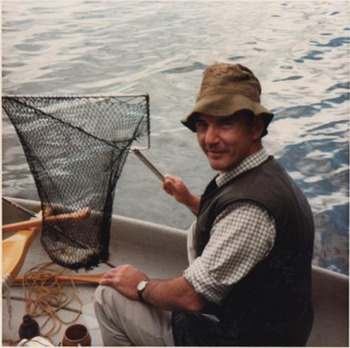
After active service in the Korean War in the RAMC's 26th Field Ambulance Unit, Donald went to King's College (Newcastle) that was then part of the University of Durham. He graduated in 1956 and boarded the train for Cambridge to begin postgraduate research. Fortunately for him, Dr Parr Tate, Director of The Molteno Institute, undertook to supervise his research and to introduce him to Christ's College. Donald flourished at Christ's. His talent was quickly recognized by his being awarded the Darwin Prize and elected to a Research Fellowship in 1958, a year before he received the Degree of Doctor of Philosophy from the University of Cambridge. In 1961 Donald, his wife Shirley and their young family moved to Texas where he worked at The Rice Institute with Clark Read as a post-doctoral Fellow.
By the time of his return to The Molteno Donald had become one of the first scientists to use the electron microscope in the investigation of parasitological problems. His most important and enduring contributions to knowledge stemmed from his research during the 1960s and the first years of the 70s. He elucidated (1) many aspects of the structure and functions of the surface and deeper layers of the body wall of animal-parasitic nematodes, and (2) host–parasite relations between the protozoon Histomonas meleagridis and the nematode Heterakis gallinarum.
Any lingering view that the nematode body wall was an inert cuticle was dispelled by his finding evidence of its enzyme activity and the location of haemoglobin in addition to his detailed descriptions of its complex anatomy. His work advanced our understanding of how nematodes moult. A measure of the quality of this body of work is its citation in nine of the 12 chapters in the second edition of The Structure of Nematodes (Academic Press) published in 1991 by Alan and Jean Bird. Much of his own and related observations on helminth body walls were succinctly summarized in his reviews in Advances in Parasitology (Academic Press) in 1966 and 1972.
Blackhead, a serious disease of turkeys, but less so in other galliform species, results from infection of the caeca and viscera with Histomonas meleagridis, a pleomorphic protozoan parasite. Transmission of Histomonas occurs when birds swallow embryonated eggs of the nematode Heterakis gallinarum which also inhabits the caeca. This unusual situation, whereby transmission of one parasite depends on the transmission of another, had been known since 1920. About 50 years later, Donald discovered how the histomonads develop inside their female nematode host and then penetrate its developing eggs. His purposeful and elegant use of the EM together with other studies led to his being awarded the Scientific Medal of the Zoological Society of London in 1971. The work on Histomonas was undertaken at the ARC's Houghton Poultry Research Station near Cambridge. Donald was Head of Parasitology at Houghton from 1966 to 1971 and while there was awarded a special merit promotion to Senior Principal Scientific Officer. Meanwhile Christ's College continued to value his scholarship and his Fellowship continued while he was at Houghton Poultry Research Station. He resigned the Fellowship in 1971 on his appointment to the Chair of Agricultural Zoology at the University of Leeds. During this highly productive period, Donald found time to write The Physiology of Nematodes (Oliver & Boyd) published in 1965. The second edition, co-authored with H.J. Atkinson, appeared with Macmillan in 1976. His formal retirement from Leeds came in 1996, but The Biology of Nematodes (Taylor & Francis) appeared in 2002 with contributions by Donald and edited by him.
Donald was a Geordie born in Blaydon on Tyneside. Blaydon emerged during the industrial revolution and rapidly became a centre of coal mining, heavy industry and a railway hub. There is no doubt that Donald had inherited the northern work ethic. Other obituary notices have emphasized his willingness and capacity to work unstintingly for the institutions and organizations that employed and recruited him. Especially impressive are his distinguished service as Pro-vice-Chancellor at Leeds, as a stalwart of the Society of Biology, and as President of the British Society for Parasitology. His work for the Society of Biology was publicly acknowledged with the award of the President's medal in 2011. He served on the editorial board of Parasitology from 1964 to 1978 where much of his best work was published.
We remember well and with affection the young Donald in Cambridge before he shouldered the inevitable burden of administration and management that seems to overtake those whose early years at the bench have been so successful. In those days, The Molteno sustained a happy and lively community that was enriched by Donald's enormously infectious curiosity and enthusiasm for research. Above all, however, we benefited from his friendship and kind and generous nature. Donald always ensured that we had the chance to meet and share our work with his stream of visitors and he and Shirley regularly invited members of The Molteno community to their home. Donald and Shirley enjoyed a long and happy marriage blessed by their three children. Upon retirement Donald was able to spend more time with his grandchildren and enjoy gardening at his home in Blanchland. He was able to indulge in his love of fly-fishing in the nearby Derwent Reservoir. The hat he is wearing in the photograph accompanying this notice is the one he wore in Korea.
We began this notice with Donald heading south for Cambridge to begin what became a most impressive career. On the train to Cambridge a young lady asked him to help her with her luggage. Like the gentleman he always was Donald willingly responded. She was Shirley and they were married in due course. Throughout his life Donald showed that family and people around him must have top priority.



